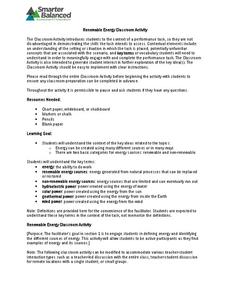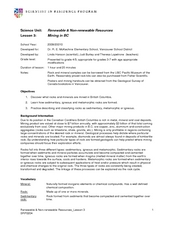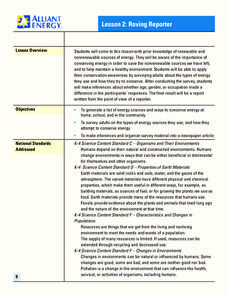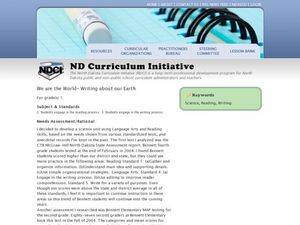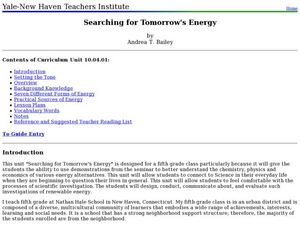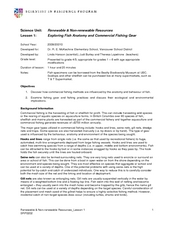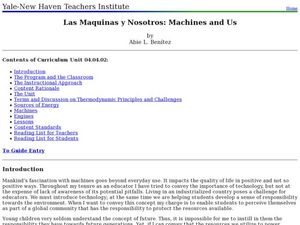Smarter Balanced
Renewable Energy
Renewable and non-renewable energy sources are the focus of a series of activities that prepare learners for a performance task assessment on energy. Groups identify the various sources of energy and classify these sources as either...
K12 Reader
Limited Resources
The difference between renewable and non-renewable resources is the focus of a short reading comprehension worksheet that asks kids to respond to a series of questions based on the provided passage.
Curated OER
Renewable Energy Sentences
Learners construct sentences using nouns and verbs from a "renewable energy" word bank. In this cross curriculum ecology and sentence structure grammar and mechanics lesson, students listen to the book Our Earth: Clean Energy by Peggy...
K12 Reader
Limited Resources
Here's a comprehension exercise that asks readers to include direct quotes in their analysis of an article on ways to conserve natural resources.
Bonneville
Informative Writing: Where Does Energy Come From?
Get energized about all the different sources of energy. A research project has scholars investigate a renewable or non-renewable energy type of their choice. They write a report on their findings and decide on a way to publish their work.
Council for Economic Education
Teaching Economics Using Children's Literature
Introduce young learners to the subject of economics using their favorite stories and books. Including 24 separate lessons, this guide covers economic principles such as trade, scarcity, consumer goods and services, renewable and...
Curated OER
Renewable and Non-Renewable Resources: Mining in B.C.
Students explore energy by categorizing rocks. In this British Columbia geology lesson, students define many different vocabulary terms associated with mining such as sedimentary, igneous, and metamorphic. Students utilize sample rock...
Curated OER
Renewable Energy and
Students identify and explore renewable energy options and then research, develop and install a renewable energy system in their school or community. Students identify the use of renewable energy sources in the north, demonstrate their...
Curated OER
Renewable Energy
Students examine the United States' current and future energy needs. They describe different forms of renewable energy sources and compare the impacts of renewable and non-renewable energy sources on the earth and society.
Channel Islands Film
Magic Isle: Lesson Plan 1
What are the factors that limit growth and expansion? As part of their study of Catalina Island, class members view the West of the West's documentary Magic Isle and research William Wrigley and the Santa Catalina Island Company. After...
Curated OER
Roving Reporter
Students write a report about energy use. In this conservation lesson, students interview adults about their use of renewable and nonrenewable energy. Students synthesize this information and write a report from the point of view of a...
Curated OER
We are the World - Writing about our Earth
First graders write facts about the Earth. In this Earth instructional activity, 1st graders discuss natural resources, recycling, and how to keep the Earth clean. They work in groups to create a small book with 3-5 facts about the...
Curated OER
Searching for Tomorrow's Energy
Fifth graders investigate energy. In this biology lesson plan, 5th graders will learn about energy, fossil fuels, and renewable and nonrenewable resources. Students will be participating in three lab activities which are described in...
Curated OER
Fossil Fuels: Facing the Issues
Students explore energy by researching fuel usage on Earth. In this fossil fuel lesson, students define fossil fuels, the energy created by burning them, and the impact on the environment when using them. Students conduct pollution...
Curated OER
Earth Kids: Kindergarteners Taking Care of the Earth
Students explore a variety of ways of how to care for the environment in the nine lessons of this unit. They observe how to be responsible "Earth Kids."
Curated OER
We are all Responsible
Pupils desribe the interdependence between humans and nature and positive behavior with regards to natural resources. They demonstrate respectful attitudes and behaviors with regards to the environment. Students gain knowledge of...
Curated OER
U.S. Geography: The Northeast
Students investigate U.S. Geography by creating a map in class. In this natural resource lesson, students create a map of the United States and research the Northeast based on their resources and recyclable materials. Students...
Curated OER
To Live I Need...
Students state one item previously considered to be "essential" which he/she could live without.
Curated OER
Watershed Model
Students view a presentation of water and land and how we need to protect our water resources. For this water lesson plan, students discuss how we rely on water, and complete activities in all subjects related to water.
Curated OER
Wood
Students practice reading comprehension strategies. In this literacy and science lesson, students read a non-fiction article about wood and locate main ideas and details. Students construct a card game using information taken from the text.
Curated OER
Pesticide Watch Card
Students examine human health by identifying dangerous pesticides. In this agriculture instructional activity, students research the food production system in the United States and discuss dangers such as pesticides, chemicals and...
Curated OER
Exploring Fish Anatomy and Commercial Fishing Gear
Students investigate commercial fishing by exploring the technical methods. In this environmental lesson, students identify the fish that are most commonly consumed by humans and trace their path from ocean to plate. Students...
Curated OER
Global Warming
Pupils read information about global warming and make their own greenhouse. In this global warming lesson, students read several pages of global warming and climate information. Pupils then make their own greenhouse and answer several...
Curated OER
Las Maquinas y Nosotros: Machines and Us
Second graders explain the relationship between energy and work. In this technology lesson plan, 2nd graders describe the different uses of machines in their everyday lives. They record observations and data in their science journal.
